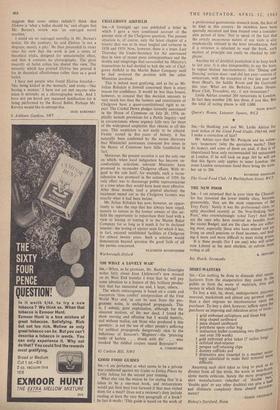C7rIALGROVE AIRFIELD SIR,—A fortnight ago you published a letter in
which I gave a very condensed account of the present state of the Chalgrove question. The present situation is, of course, only the latest chapter of a history that was at its most tangled and tortuous in 1958 and 1959. Now, however, there is a truce. Last Thursday the Under-Secretary for Air announced that in view of recent press correspondence and the doubts and misgivings that surrounded his Ministry's transactions he had decided to halt the sale of Chal- grove Airfield to the Martin Baker Company until he had reviewed the position with the other Ministries involved.
This is indeed most gratfying, and as far as Mr. Julian Ridsdale is himself concerned there is every reason for confidence. It would be less than honest, however, to conceal that this decision amounts to very much less than the farmers and constituents of Chalgrove have a quasi-constitutional right to ex- pect. The Crichel Down pledges formally announced in the House of Commons on July 20, 1954, ex- plicitly include provisions for a Public Inquiry—and in circumstances whose urgency falls very far short of the widespread scepticism that obtains in all this area. This scepticism is not easily to be allayed. Firmly rooted in five years of history, it has naturally been confirmed by the recent discovery that Ministerial assurances conveyed five times to the House of Commons have little foundation in fact.
Moreover, the present occasion is not the only one on which, when local indignation has become un- comfortably articulate, relevant Ministries have promised to reconsider Chalgrove affairs. With re- gard to the sale itself, for example, such a recon- sideration was promised in the autumn of 1959. Its only effect was to discourage public representations at a time when they would have been most effective. After three months (and a general election) the treatment meted out to the Chalgrove farmers was exactly what it had been before.
Mr. Julian Ridsdale has now, however, an oppor- tunity to take the step that has always been urged, namely to restore to the former owners of this air- field the opportunity to repurchase their land with a view to leasing or renting it to the Martin Baker Company for as long as it needs it for its declared interest—the testing of ejector seats for which it has, in fact, enjoyed uninhibited facilities at Chalgrove for almost twenty years. Such a solution would demonstrate beyond question the good faith of all the parties concerned.
War borough, Oxford
ELIZABETH ROTHENSTEIN


































 Previous page
Previous page